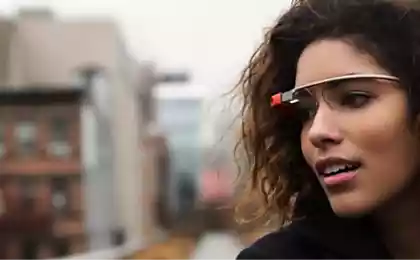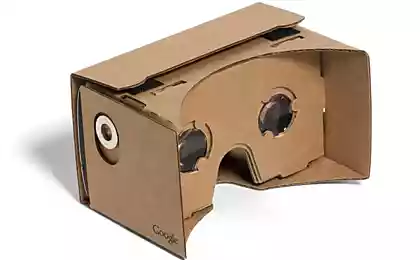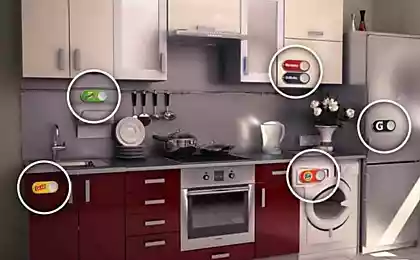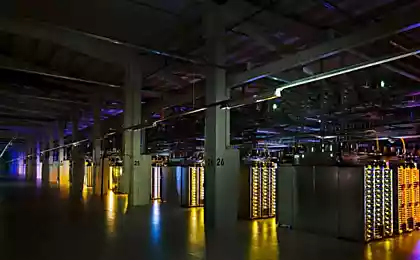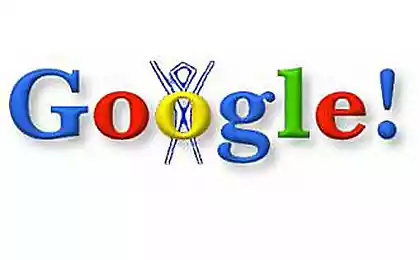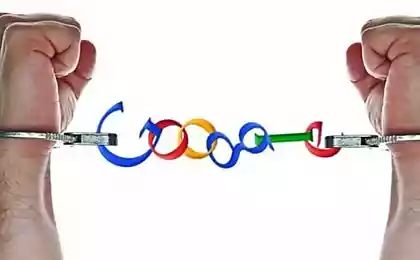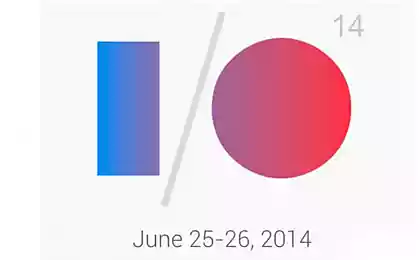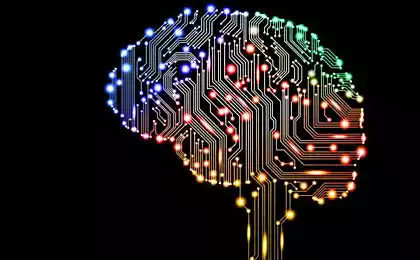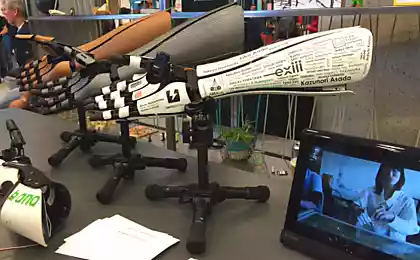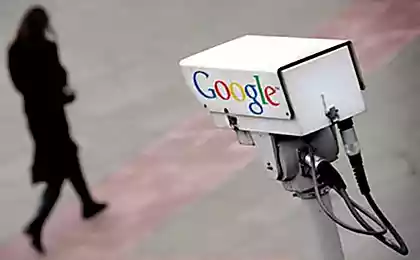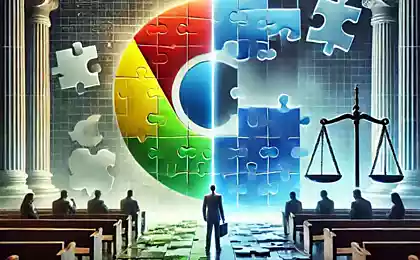997
What makes the Internet of Things with private life?
This week, the chairman of the board of directors of Google, Eric Schmidt, speaking at the World Economic Forum in Davos , suggested that in the future the Internet will be everywhere and nowhere - it will be built into everything with which we interact.
"The Internet will disappear," - he predicted in an interview with The Hollywood Reporter . - "There will be so many IP-addresses ... so many devices, sensors, and sensors with whom you interact, they become part of your life. Imagine that you walk into a dynamic room in which all things work for your team »
This forecast does not look so ridiculous, given the статистику growth of connected devices . In the past year, the number of "smart" things was approaching 3.8 billion, this year the estimated number - 4.9 billion, and by 2020 will grow to 25 billion.
In Google уже there Nest - manufacturer of connected devices for the home, such as пожарная alarm and intelligent термостат. Nest, in turn, владеет Dropcam - manufacturer of monitoring Wi-Fi cameras for home. Маунтин-Вью bet on "smart home", which is associated with the sensor system "smart car».
Another of the incredible (who knows ...) forecasts "Connecting the Future", voiced in Davos, a group of Harvard professor was a scenario where robots mosquitoes steal our DNA samples, according to Mail Online . "Life as it was already impossible," - said Professor Margo Seltzer computing. - "Relatively speaking, privacy is dead».
In fact, as later told Seltzer, no need for robotic mosquitoes to violate the sanctity of our privacy. The turning point, fretting privacy, has already come - with the current development of digital technology, not to mention a futuristic technologies such as robots mosquitoes.
"The idea is that we do not need all-seeing sensors to such scenarios come true. We have a huge reserve of digital footprint, using our everyday technology: credit and debit cards, web pages, roads, highways, social networks and e-mail "- she said. Seltzer is not in favor of the rejection of his personal life, as it might seem, after reading the article Mail Online. She believes it is important to regulate the use and storage of data, rather than out of any technology.
"The technology - a tool, it is neither good nor bad. Hammer - a useful tool for nailing, but that does not mean that someone can not use it to kill. We have laws that prohibit killing, without specifying how this tool is prohibited to kill. Similarly, we need laws on the use of data, but not the use of technology, "- added the professor.
With your permission
Of the entire speech in Davos Schmidt should be emphasized that this invisible, comprehensive web of sensors will build their networks with your permission. Perhaps these words were addressed to the Chairman of the Federal Trade Commission, Edith Ramirez, who at the International Consumer Electronics Show (CES) showed concern security and privacy of the Internet of Things.
"The Internet of Things has a huge potential and a lot of advantages for consumers, but also can lead to dire consequences for the security and privacy," - she said. - "Smart devices increase comfort and improve medical care, as well as the collection, transmission and storage of consumer data, some of which can be very personal, thus creating a number of risks to privacy».
Ramirez said that without the support of business in the optimization of the data collected, for example, collecting only the data needed, and not all in a row, the risks to the security of private life can be huge. The problem is that we can not achieve the strict standards of confidentiality in the current Internet, not to mention a distributed network of sensors, in which no one uncontrolled point in our lives. Currently, the Internet or mobile internet, in extreme cases, can be turned off by the user, if it is off the router or phone (and put it in the fridge if it's paranoia after Snowden).
But one day, the spread of the network of sensors will reach the critical point where we are without her help we can not just give up. If only we do not have some kind of control that can provide privacy and consumer rights. Without such a consumer-oriented management approach, the user loses the ability to actually perceive themselves offline, and given that the main method of control devices to this day - the switch incl. / Off, it must be integrated into all utilities, in every part of this majestic, overwhelming the Internet of Things.
In parallel with the rapid development of the Internet of Things requires to reach a new level of automation and autonomy devices, taking into account the emergence of a dense web of network objects, and given the downside risks to the control of the user. Smart devices will collect information, communicate with each other in the cloud, intertwined and form unique utilities like Schmidt apparently believes. But these tools eventually will form a more complete picture of the actions and intentions of people in real life. These data must be well protected by the laws on privacy.
Early generations of digital technology, such as e-mail, had no protection. Therefore, the case history, such as with Snowden in which the secret services of the military-industrial complex are a fool. Now imagine the scale of the tragedy on the Internet of Things, which at the same time everywhere, but nowhere, which is invisible to the user, but he knows more about it himself, which is impossible to resist or to properly monitor.
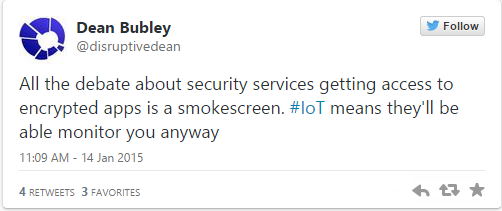
All the arguments about security of encrypted applications - dust in the eyes. Internet of things will allow you to control in any case. - Dean Bubley i>
It is on the Internet of Things Schmidt wants to build a sales strategy Empire Google. A higher level of data collection will allow Google users to know more about them, respectively, to sell more. So all this tinsel advertising from Google is actually a steel core business, monetary pipe through which you can manage your intentions in real time.
All information about the users who know the modern search algorithms ridiculous compared to that which can be obtained from a distributed system of sensors. The more of their devices the user is connected to this system, the more complete picture of him will see Google. (Theme: Goggle acquired engaged artificial intelligence company DeepMind - Developer universal learning algorithms).
Internet of the future will go into the shadows, as suggested by Schmidt, but that does not mean that he will not direct all their computing power to create a hidden card with information about us, who we are and what we do. Technology digital future can become the new great marketing tool, but it does not mean that it is inevitable.
Seltzer says we should not lose heart, but to think about how to use our data. We need to think about creating regulators to understand the extent of the risks to privacy associated with the appearance of a dense web of network objects. The primary objective of the future strategy - to protect the user and help control the processing of personal data. Without this strategy, there is the risk of no confidence to the business users connected devices to their invasive, deeply penetrating products and services. In a very personal sphere of the Internet of Things, user trust is paramount. Therefore, to form the basis for regulation of the data collection is necessary for all participants in the business.
In the real world we have cars and roads. But just as we have speed limits. The key to success on the way to the close-packed universe of connected devices is a regulator of the World Wide Web Sensors - original speed limit future.
Source: geektimes.ru/post/244866/
"The Internet will disappear," - he predicted in an interview with The Hollywood Reporter . - "There will be so many IP-addresses ... so many devices, sensors, and sensors with whom you interact, they become part of your life. Imagine that you walk into a dynamic room in which all things work for your team »
This forecast does not look so ridiculous, given the статистику growth of connected devices . In the past year, the number of "smart" things was approaching 3.8 billion, this year the estimated number - 4.9 billion, and by 2020 will grow to 25 billion.
In Google уже there Nest - manufacturer of connected devices for the home, such as пожарная alarm and intelligent термостат. Nest, in turn, владеет Dropcam - manufacturer of monitoring Wi-Fi cameras for home. Маунтин-Вью bet on "smart home", which is associated with the sensor system "smart car».
Another of the incredible (who knows ...) forecasts "Connecting the Future", voiced in Davos, a group of Harvard professor was a scenario where robots mosquitoes steal our DNA samples, according to Mail Online . "Life as it was already impossible," - said Professor Margo Seltzer computing. - "Relatively speaking, privacy is dead».
In fact, as later told Seltzer, no need for robotic mosquitoes to violate the sanctity of our privacy. The turning point, fretting privacy, has already come - with the current development of digital technology, not to mention a futuristic technologies such as robots mosquitoes.
"The idea is that we do not need all-seeing sensors to such scenarios come true. We have a huge reserve of digital footprint, using our everyday technology: credit and debit cards, web pages, roads, highways, social networks and e-mail "- she said. Seltzer is not in favor of the rejection of his personal life, as it might seem, after reading the article Mail Online. She believes it is important to regulate the use and storage of data, rather than out of any technology.
"The technology - a tool, it is neither good nor bad. Hammer - a useful tool for nailing, but that does not mean that someone can not use it to kill. We have laws that prohibit killing, without specifying how this tool is prohibited to kill. Similarly, we need laws on the use of data, but not the use of technology, "- added the professor.
With your permission
Of the entire speech in Davos Schmidt should be emphasized that this invisible, comprehensive web of sensors will build their networks with your permission. Perhaps these words were addressed to the Chairman of the Federal Trade Commission, Edith Ramirez, who at the International Consumer Electronics Show (CES) showed concern security and privacy of the Internet of Things.
"The Internet of Things has a huge potential and a lot of advantages for consumers, but also can lead to dire consequences for the security and privacy," - she said. - "Smart devices increase comfort and improve medical care, as well as the collection, transmission and storage of consumer data, some of which can be very personal, thus creating a number of risks to privacy».
Ramirez said that without the support of business in the optimization of the data collected, for example, collecting only the data needed, and not all in a row, the risks to the security of private life can be huge. The problem is that we can not achieve the strict standards of confidentiality in the current Internet, not to mention a distributed network of sensors, in which no one uncontrolled point in our lives. Currently, the Internet or mobile internet, in extreme cases, can be turned off by the user, if it is off the router or phone (and put it in the fridge if it's paranoia after Snowden).
But one day, the spread of the network of sensors will reach the critical point where we are without her help we can not just give up. If only we do not have some kind of control that can provide privacy and consumer rights. Without such a consumer-oriented management approach, the user loses the ability to actually perceive themselves offline, and given that the main method of control devices to this day - the switch incl. / Off, it must be integrated into all utilities, in every part of this majestic, overwhelming the Internet of Things.
In parallel with the rapid development of the Internet of Things requires to reach a new level of automation and autonomy devices, taking into account the emergence of a dense web of network objects, and given the downside risks to the control of the user. Smart devices will collect information, communicate with each other in the cloud, intertwined and form unique utilities like Schmidt apparently believes. But these tools eventually will form a more complete picture of the actions and intentions of people in real life. These data must be well protected by the laws on privacy.
Early generations of digital technology, such as e-mail, had no protection. Therefore, the case history, such as with Snowden in which the secret services of the military-industrial complex are a fool. Now imagine the scale of the tragedy on the Internet of Things, which at the same time everywhere, but nowhere, which is invisible to the user, but he knows more about it himself, which is impossible to resist or to properly monitor.

All the arguments about security of encrypted applications - dust in the eyes. Internet of things will allow you to control in any case. - Dean Bubley i>
It is on the Internet of Things Schmidt wants to build a sales strategy Empire Google. A higher level of data collection will allow Google users to know more about them, respectively, to sell more. So all this tinsel advertising from Google is actually a steel core business, monetary pipe through which you can manage your intentions in real time.
All information about the users who know the modern search algorithms ridiculous compared to that which can be obtained from a distributed system of sensors. The more of their devices the user is connected to this system, the more complete picture of him will see Google. (Theme: Goggle acquired engaged artificial intelligence company DeepMind - Developer universal learning algorithms).
Internet of the future will go into the shadows, as suggested by Schmidt, but that does not mean that he will not direct all their computing power to create a hidden card with information about us, who we are and what we do. Technology digital future can become the new great marketing tool, but it does not mean that it is inevitable.
Seltzer says we should not lose heart, but to think about how to use our data. We need to think about creating regulators to understand the extent of the risks to privacy associated with the appearance of a dense web of network objects. The primary objective of the future strategy - to protect the user and help control the processing of personal data. Without this strategy, there is the risk of no confidence to the business users connected devices to their invasive, deeply penetrating products and services. In a very personal sphere of the Internet of Things, user trust is paramount. Therefore, to form the basis for regulation of the data collection is necessary for all participants in the business.
In the real world we have cars and roads. But just as we have speed limits. The key to success on the way to the close-packed universe of connected devices is a regulator of the World Wide Web Sensors - original speed limit future.
Source: geektimes.ru/post/244866/
